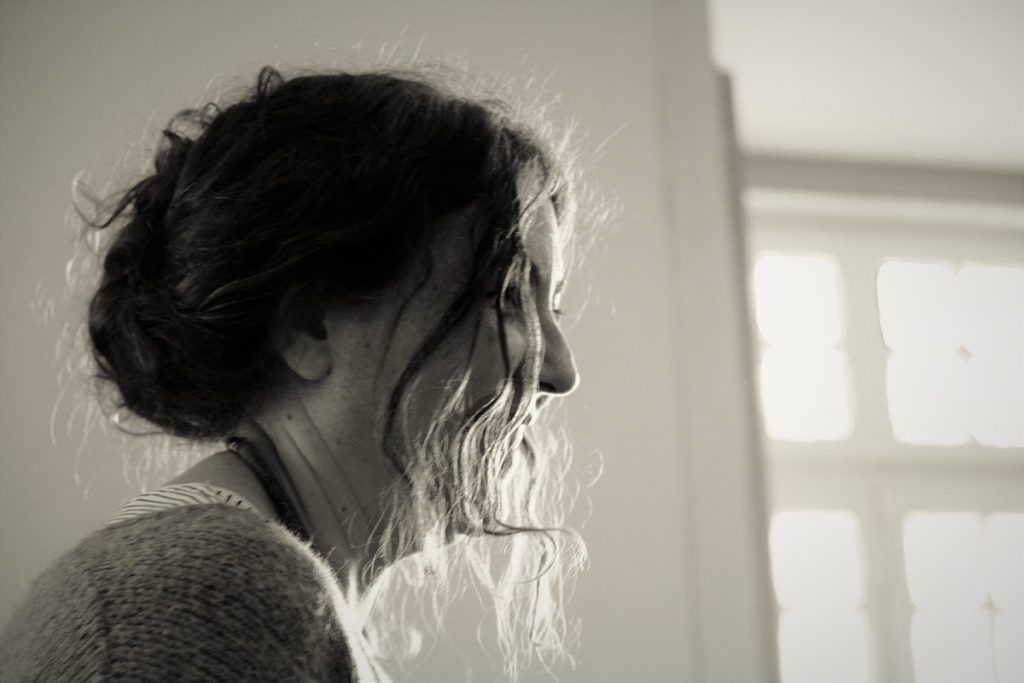
One day I heard Luisa play a Chopin waltz and I felt like dancing.
I had never before wanted to dance to a Chopin waltz.
No matter how danceable Chopin’s waltzes were, it was when listening to Luisa that I felt like dancing.
The fingers extend over the keys.
It’s not the fingers that touch.
The body and the piano merge.
The fingers are dendritic branches that transmit to the piano body the vibration of the body that touches it.
The piano receives from its soul, the vibration that amplifies and returns the echoing sound, the dancing rhythm, the modulation that surrounds and prolongs the music that is born unique and unrepeatable in each moment.
A harmony that brings us to ourselves.
Telling stories, without beginning or end.
Wrapping us in a circular maze, in multiple spirals, in a time that passes.
There is something strange when the hands then move away and land on her lap.
What was once, one no longer seems to be.
We hesitate. It always takes a while to realize reality after hearing Luisa playing..
It is not easy to line up Luísa Gonçalves’s music in currents or musical tendencies.
Like its composer, the music she creates is hard to fit in drawers and tidy up in ratings.
Even that is unique. Starting from a classical formation does not impose upon it.
Though based on a very strong technique, it does not show it. Both are present in all the work; neither is free. Even that is unique.
I play at my own risk
Born into a family of musicians and artists, Luisa began musical studies in childhood.
She joined the Santa Cecilia Academy of Music at the age of four and by the age of sixteen had her general musical course completed at the Lisbon Conservatory.
She started composing equally early.
Her first recorded composition, played on piano and sung by her, was at eight years old after a family Christmas in London.
She listened to an old popular English melody and later wrote a poem, adapting it for her first “Spring Song.”
Intuitively she had taken the first step of her future career.
During her piano studies and within the compositions of Debussy, Ravel and all the great composers, she was always inventing new melodies and harmonies.
After four years developing her technique with a private Russian teacher she decided to go to Porto to complete the piano Upper Course in ESMAE.
She always felt curiosity about other worlds of music approaching; and art and life itself.
During her teenage years she had private jazz piano lessons and went to jazz masterclasses.
She also joined pop bands and listened to diverse music styles,
all the while composing songs and pieces for theater, dance and poetry.
Luisa is always searching for Nature. Its input surrounds, informs and enthralls her. She spreads that feeling to the sound.
“Sound moves me.”
Luisa’s highest dedication, while studying the instrument, was to find a proper piano sound; to uncover
(no matter the time it takes) a deep understanding of the musical construction, style, feeling and ideas beneath any piano piece she played. Sometimes trading efficiency in favor of the need for consistency with herself.
Probably that stubborn heart committed work led to improvising, as in the old cadenzas.
The knowledge of each piece develops deeply over time and gives opportunity for a deconstruction game.
Novel and intelligent musical ideas can inform a new piece.
It can also happen that while playing and absorbing all the influences of the moment a composition in real time emerges; a quite different approach from improvising.
After leaving Porto she entered Évora University to take her masters degree in piano performance with the pianist Antonio Rosado.
In the last ten years she has given concerts with poets, mainly between Lisbon and Paris, and released her first CD – Book of Songs.
She continues to work for the Festival Parfums de Lisbonne and composes and plays with several projects.
Her recent work for piano solo – O Cuco (released December 2018) was for children, and out soon is another piano solo CD – Unno /17, supported by Gestão dos Direitos dos Artistas (GDA).
Luisa teaches piano, especially to children from 4 years old.
She has her own Suzuki piano studio, giving private lessons, and is the first Portuguese Suzuki teacher.
She trained in Madrid and Malaga with the Finnish teacher Maarit Honkanen in the European Suzuki Association.
She gives thanks to other musicians and her significant piano teachers: Sharon Miranda, Leonor Fernandes, Ana de Sousa Lima, Tania Achot, Luis Filipe Sá, Miguel Borges Coelho, Sofia Lourenço, and António Rosado among others.
Credit goes to many others involved in her music work. In pop and song writing – Bernardo Devlin and Flak. In jazz – Mario Laginha and Carlos Azevedo. In composition – Cristopher Bochmann and Cesar Viana; and in performance and poetry – Graça dos Santos.
Thanks also for the participation in Maria João Pires’ workshop in Belgais; for a workshop with Sir Roland Hanna, and for the listening of Sequeira Costa at the Gulbenkian.
Special thanks to Maurice Gendron – a very supportive conductor encouraging the pursuit of her musical studies during childhood.
Greatly appreciated has been the support from the Fundação Calouste Gulbenkian to attend musical meetings in Strasbourg, Geneve and Hamburg. And finally, some very important moments of joy and learning.